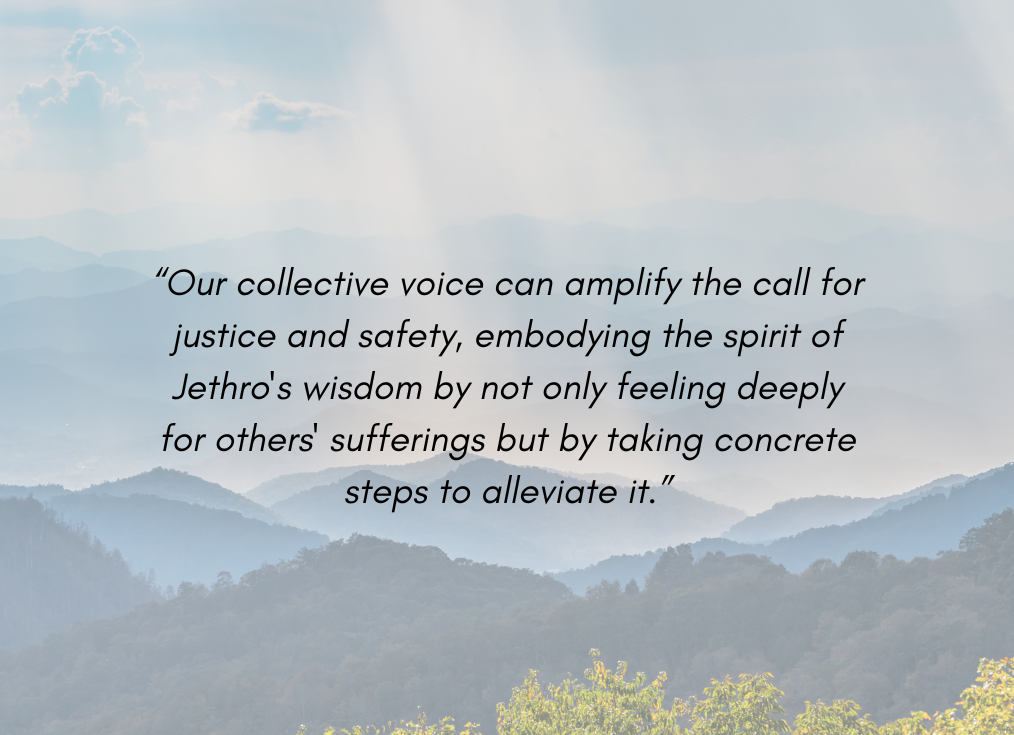Empathy in Action

February 2, 2024 / 23 Shevat 2024
In this week’s Torah portion, Yitro, we find profound lessons that transcend time and circumstance, speaking directly to the heart of human interaction, leadership, and the essence of empathy. The portion is named after Moses’ father-in-law, Jethro (Yitro in Hebrew), who plays a pivotal role in shaping the future of Israelite leadership and, by extension, offers us timeless wisdom on the application of empathy.
The narrative in Exodus chapter 18 paints a vivid picture of Jethro’s deep empathy and understanding. Upon reuniting Moses with his family, Jethro observes Moses’ daily grind, where Moses takes on the Herculean task of personally adjudicating every dispute among the Israelites. Witnessing Moses’ exhaustive routine from dawn to dusk, Jethro counsels Moses on the sustainability of his leadership model. He proposes a tiered system of governance, suggesting the appointment of “capable individuals who fear Gd—trustworthy ones who spurn ill-gotten gain” (21) to serve as leaders of varying group sizes, thereby decentralizing the judicial process.
This narrative isn’t merely about administrative restructuring; it’s a profound lesson in empathy. Jethro’s actions reflect a holistic approach to empathy: he not only recognizes Moses’ strain but also offers a practical solution to alleviate it. This teaches us that true empathy extends beyond understanding and sharing the feelings of another; it involves taking actionable steps to mitigate their challenges.
…
The relevance of this lesson is mirrored in this past Tuesday’s visit by the extended family members of three hostages still being held captive by Hamas. These family members highlighted a critical distinction: while empathy for their horrific situation is appreciated, it is insufficient without concrete actions to address their anguish. Their message underscores that empathy, to be fully realized, requires accompanying actions that target the root of the problem.
The crisis with the hostages, having been held captive for 119 days, is a stark reminder that empathy, while essential, must not be the end of our involvement in others’ struggles. True empathy calls for us to engage actively in seeking solutions, be it through advocacy, support, or direct intervention.
Another poignant example that took place this week was the Jewish Federation’s partnership with the Consulate General of Israel to the Southwest to present a private closed-door viewing of the IDF (Israel Defense Forces) collected footage from the horrific October 7 Hamas massacre in Israel. This footage was screened by San Antonio leaders, elected officials, members of the clergy, academia, media, law enforcement, and business community, with the explicit approval of the Israeli Government, which has previously only been shown in exclusive viewings, including to the Israeli Parliament (Knesset), U.S. Senate, U.S. House of Representatives, as well as to select members of the international media, community leaders, and others. Many tears were shed during the gut-wrenching viewing but after its conclusion, the overwhelming empathy was tangible and explained to simply not be enough. Now, action needs to be taken!
As we reflect on the lessons from parashat Yitro, let us be motivated to move beyond passive empathy towards active engagement. Let this serve as a call to action for each of us to reach out to our local officials through calls, emails, or personal visits. It is imperative to convey the urgency of action to bring the hostages home and to reaffirm Israel’s right to defend itself against acts of terror. Our collective voice can amplify the call for justice and safety, embodying the spirit of Jethro’s wisdom by not only feeling deeply for others’ sufferings but by taking concrete steps to alleviate it.
Through embracing the ethos of proactive empathy, as exemplified by Jethro, we can transform our communities and society at large. Let us be inspired to act with compassion and determination, ensuring that our empathy translates into meaningful change for those in need. Because we are…
Shabbat Shalom.

